-
REAGENT SERVICES
Hot!
-
Most Popular Services
-
Molecular Biology
-
Recombinant Antibody/Protein
-
Reagent Antibody
-
CRISPR Gene Editing
-
DNA Mutant Library
-
IVT RNA and LNP Formulations
-
Oligo Synthesis
-
Peptides
-
Cell Engineering
-
- CRISPR/Cas9 sgRNA
- CRISPR/Cas12a crRNA
- Prime Editing Guide RNA
- Base Editing Guide RNA
- HDR Templates
- gRNA + HDR Template Design Tools
- cGMP Guide RNA
- cGMP HDR Templates
- CRISPR/Cas Proteins
- CAR-T Knock-in Optimization Kit
- CRISPR Plasmids
- CRISPR gRNA Plasmid Libraries
- CRISPR Cell Lines
- Microbial Genome Editing
-
-
PRODUCTS
-
Most Popular Products
-
Antibodies
-
ELISA Kits
-
Protein Electrophoresis and Blotting
-
Protein and Antibody Purification
-
Recombinant Proteins
-
Molecular Biology
-
Stable Cell Lines
-
Cell Isolation and Activation
-
 IVD Raw Materials
IVD Raw Materials
-
 Therapy Applications
Therapy Applications
-
Online Shop
-
Resources
-
![AmMag™ Quatro Automated Plasmid Purification]() AmMag™ Quatro automated plasmid purification
AmMag™ Quatro automated plasmid purification
-
![Anti-Camelid VHH]() MonoRab™ Anti-VHH Antibodies
MonoRab™ Anti-VHH Antibodies
-
![Precast Gels]() SurePAGE™ Precast Gels
SurePAGE™ Precast Gels
-
![Quatro ProAb Automated Protein and Antibody Purification System]() AmMag™ Quatro ProAb Automated Protein and Antibody Purification System
AmMag™ Quatro ProAb Automated Protein and Antibody Purification System
-
![Target Proteins]() Target Proteins
Target Proteins
-
![AmMag™ Quatro Automated Plasmid Purification]() AmMag™ Quatro automated plasmid purification
AmMag™ Quatro automated plasmid purification
-
 IVD Raw Materials
IVD Raw Materials
-
![Quick
Order]() Quick Order
Quick Order
-
![Quick
Order]() Quick Order
Quick Order
- APPLICATIONS
- RESOURCES
- ABOUT US
- SIGN IN My Account SIGN OUT
- REGISTER
Company News » Events » TIDES TV Interview: Neoantigen Peptides in Personalized Cancer Immunotherapy » GenScript at Tides 2020: Oligonucleotide and Peptide Therapeutics
GenScript at Tides 2020: Oligonucleotide and Peptide Therapeutics
This year’s TIDES Oligonucleotide and Peptide Therapeutics Conference took place from September 15-18. The event was virtual and offered a packed agenda of daily live talks, panel discussions, and poster presentations. Additionally, a broad range of on demand talks focused on peptide and oligonucleotide discovery and CMC approaches, genome editing, and drug delivery.

On the first day, two keynote talks helped set the stage for the broad scope of discussions. The first one, “Oligonucleotide Therapeutics: Past, Present and Future” by Dr. Muthiah (Mano) Manoharan-Senior Vice President of Drug Discovery at Alnylam, unfortunately suffered from technical challenges and was cut short. However, patient attendees were compensated by being able to engage in an extended Q&A session with Dr. Manoharan. The second keynote speaker, Dr. Tomi Sawyer, Chief Drug Hunter & President at Maestro Therapeutics, presented on “ Peptides, Past, Present and Future: A Peptide Drug Hunter Odyssey”. Dr. Sawyer’s talk focused on the landscape of the peptide field, highlighting FDA approved peptide drugs as well as key innovative steps, particularly in macrocyclic peptide platforms and pipelines.
Focus on Peptide Drug Discovery
Discovery of Semaglutide
The story of the first orally available GLP-1 peptide for the treatment of Type 2 diabetes was highlighted in Dr. Jesper Lau’s keynote presentation. Dr. Lau, Vice President, Chemical Biology, Novo Nordisk A/S in Denmark, talked about GLP-1 engineering with the goal of developing a peptide drug for administration once weekly, which led to the discovery of Semaglutide. He highlighted key obstacles in the engineering of GLP-1 analogs including physical & chemical properties, short half-life (e.g., high degradation and renal filtration), and bioavailability (e.g., oral and subcutaneous).
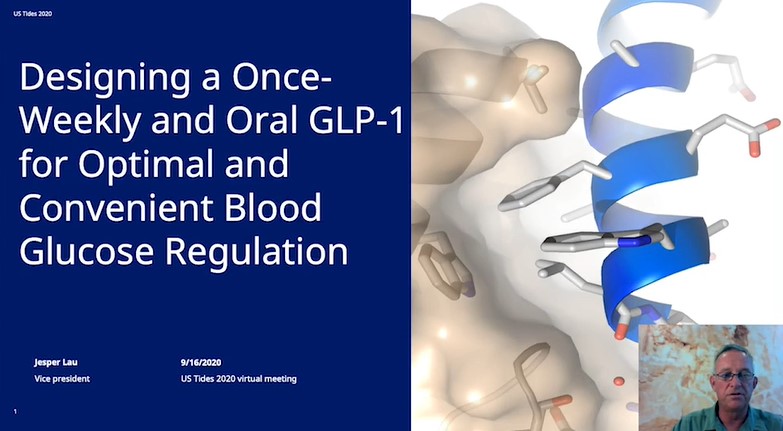
Targeting the Complement System
The Head of Complement Biology and Macrocycle Peptide Platform at UCB Ra Pharma, Dr. Camil Sayegh, presented on “Extreme Diversity Macrocyclic Peptide Platform and the Discovery of Zilucoplan”, a peptide inhibitor of complement C5. Zilucoplan is currently in clinical trials for subcutaneous administration, which would rival current treatments based on Eculizumab IV administration, indicated for the treatment of paroxysmal nocturnal hemoglobinuria. Additionally, as regulation of C5 activation and membrane attack complex (MAC) formation is implicated in generalized myasthenia gravis, Zilucoplan is undergoing Phase 3 investigation for this indication.
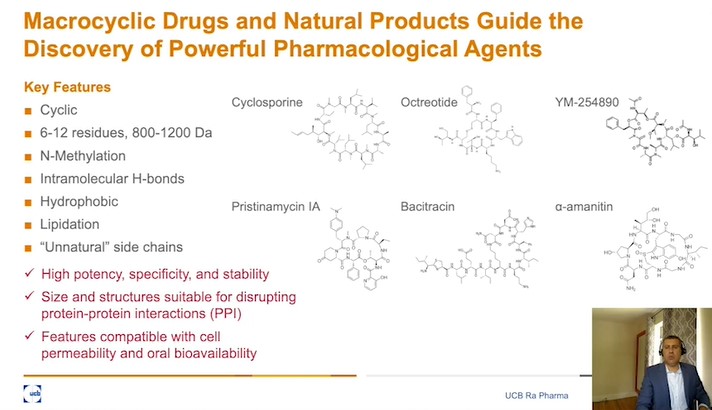
Developing Personalized Peptide Vaccines
Catherine Wu, MD, Professor of Medicine at the Dana-Farber Cancer Institute, talked about “Personal Cancer Vaccines: On the Path to Effective Cancer Immunity”. Dr. Wu introduced her talk by emphasizing the role of immunotherapy as a major pillar of cancer treatment and acknowledging the need to improve its success for a greater number of patients. She focused on the potential of personalized cancer vaccines, which aim at directing T cell immune responses against tumor specific antigens or neoantigens. Because neoantigens arise due to somatic mutations, they are unique to the tumor tissue and highly immunogenic. Therefore neoantigens may serve as powerful therapeutic targets. Next generation sequencing analysis and predictive algorithms have facilitated the identification of tumor specific neoantigens and prediction of peptide immunogenicity, respectively. For the development of personalized neoantigen based vaccines Dr. Wu’s chosen approach is the use of synthetic peptides for the treatment of melanoma and glioblastoma.
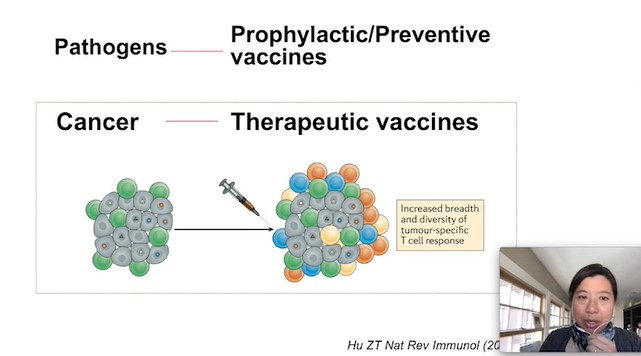
Neoantigen Peptide Therapies
GenScript had the great opportunity to participate in a TIDES TV interview hosted by Michael Keenan, Project Manager and Conference Producer at Informa Connect, to discuss neoantigens’ therapeutic applications and synthesis challenges. Dr. Samantha Zaroff discussed how GenScript leverages its peptide synthesis platform in combination with its proprietary bioinformatics tool NeoPre™ to guide the synthesis of difficult peptides such as neoantigens.
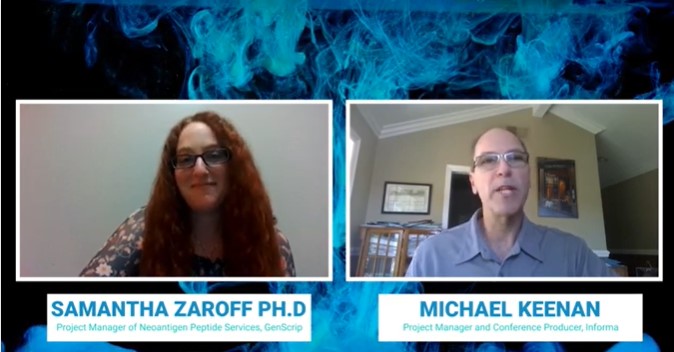
Focus on Oligonucleotide Drug Discovery
RNAi Therapeutics: From Rare to Prevalent Diseases
Dr. John Maraganore, CEO at Alnylan Pharmaceuticals, was introduced by Dr. Muthiah (Mano) Manoharan for his talk “Bringing RNAi Therapeutics to Patients around the World”. Dr. Maraganore talked about Alnylan’s pipeline and how they have reached the milestone of developing the first RNAi therapeutic, Onpattro, which has been approved internationally. Alnylan was founded with the goal of developing RNAi therapeutics for rare diseases (e.g., ATTR amyloidosis and hepatic porphyria). However, their successful pipeline is allowing them to branch off and explore the potential of RNAi therapeutics for more prevalent diseases such as MS.
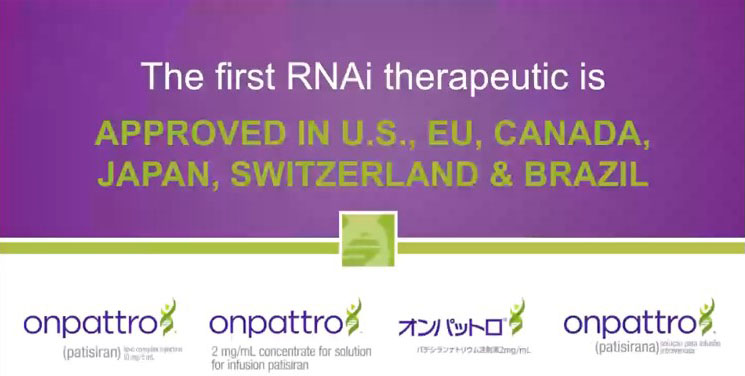
Optimizing siRNA Therapeutic Potential
Dr. Anastasia Khvorova, Professor at the RNA Therapeutics Institute, University of Massachusetts Medical School, gave the last keynote presentation at TIDES2020. A fantastic talk and the perfect end to a great summit. Dr. Khvorova’s talk focused on how her laboratory is systematically modifying the chemistry of siRNA candidates including conjugates, linker, and oligos. Her goal is to improve the functional delivery of siRNA candidates beyond the liver.
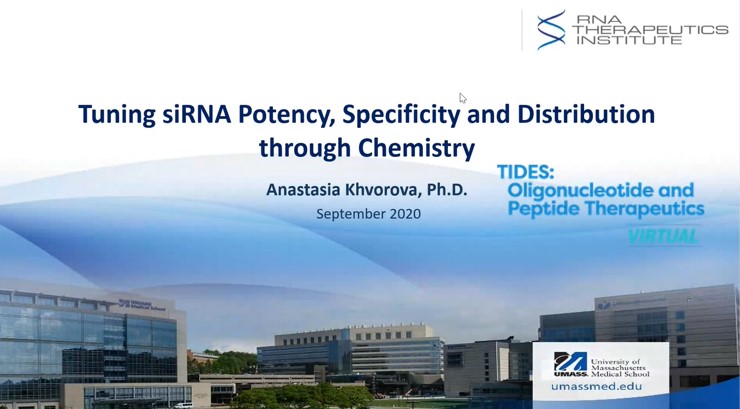

-

































